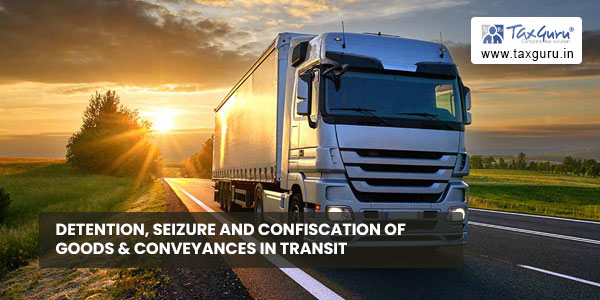Goods and Services Tax Act has provided clear provisions for the detention, seizure and confiscation of goods and conveyances in transit.
Section 129 provides for the detention, seizure and release of goods and conveyances in transit while
Section 130 provides for the confiscation of the goods or conveyances and imposition of penalty.
Before diving any deeper in the said sections, let us first understand the difference between seizure and confiscation.
Seizure is a process of taking possession of the goods against the wish of the owner. It is a process which come before the confiscation of the goods.
Confiscation is a procedure in which the seized articles are sold or disposed off by the order of the court. Confiscation is dependent on the seizure of the goods as no goods can be confiscated without being seized.
Let us move towards the detailed analysis of Section 129 and Section 130 of the CGST Act 2017.
Section 129
When the goods are transported or stored while still in transit in contravention of the provisions of the Act, all such goods and conveyances shall be liable to detention or seizure.
Statue expect the due documentation to avoid detention or seizure:
Documents requirement
The person in charge of a conveyance shall carry the invoice or bill of supply or delivery challan and in case of transportation of goods by road, shall also carry a copy of the e-way bill in physical form or in the electronic form. Rule 138 to 138D of the CGST Rules, 2017 lays down the detailed provisions relating to the E-way bills.
Procedure for the interception of conveyances.(SOP)
Here, the question arises as to what constitutes the contravention of the provisions of the Act. To clarify things and for ensuring uniformity in the implementation of the provisions of the Act, CBDT has issued Circular No 41/15/2018-GST dated 13.04.2018 as amended by Circular 49/23/2018-GST dated 21.06.2018 and Circular No 88/07/2019-GST dated 01.02.2019, which provides the procedure for the interception of conveyances.
Release of Goods and Conveyance.
The goods and the conveyance shall be released on the payment of the penalty which is explained in the below table:
| When the owner of the goods comes forward for payment | Taxable Goods | 200% of the tax payable |
| Exempted goods | 2% of the value of the goods or Rs.25000 whichever is lower. | |
| When the owner of the goods does not come forward for payment. | Taxable Goods | 200% of tax payable or 50% of the value of goods whichever is higher |
| Exempted Goods | 5% of the value of the goods or Rs.25000 whichever is lower. |
Considerable changes w.e.f 01.01.2022
The Finance Act,2021 w.e.f 01.01.2022, has made the changes in the penalty.
The penalty amount required to be paid for the release of the goods and conveyances. It has increased the penalty amount and has done away with the payment of applicable taxes. This would mean that now while filing Income tax returns, the assessee will have to disallow the amount of penalty( applicable tax merged with penalty) as compared to the penalty and applicable taxes before 01.01.2022.
Also, it is to be noted that via Union Budget 2021 and w.e.f 01.01.2022:
- Separate proceedings: seizure and confiscation of goods and conveyances in transit are made as a separate proceeding from the recovery of tax under section 74.
- Increase of penalty: 25% of the penalty is required to be paid, for filing the appeal under section 107 against the order under section 129(3), instead of 10%.
The goods and the conveyances shall also be released upon a payment of security in the form of Bank Guarantee.
Opportunity of being heard before seizure.
No goods and conveyances shall be seized without an order of detention or seizure in Form GST-MOV 06 , after providing the person an opportunity of being heard and a Notice in form GST MOV-07 within 7 days of detention. The proper officer must issue an order within seven days from the service of notice, for the payment of applicable penalty.
Section 130
Now, moving forward to the confiscation part, section 130 provides five different situations in which the goods and the conveyances are liable to be confiscated which are reproduced below:
“Section 130(1) [Where] any person—
- supplies or receives any goods in contravention of any of the provisions of this Act or the rules made thereunder with intent to evade payment of tax; or
- does not account for any goods on which he is liable to pay tax under this Act; or
- supplies any goods liable to tax under this Act without having applied for registration; or
- contravenes any of the provisions of this Act or the rules made thereunder with intent to evade payment of tax; or
- uses any conveyance as a means of transport for carriage of goods in contravention of the provisions of this Act or the rules made thereunder unless the owner of the conveyance proves that it was so used without the knowledge or connivance of the owner himself, his agent, if any, and the person in charge of the conveyance,

Under the above five conditions, all such goods or conveyances shall be liable to confiscation and the person shall be liable to penalty under section 122.
The first situation talks about the supply of goods in contravention of the provisions of the Act,( which has been discussed in detail) with intent to evade payment of tax.
Evasion of tax is an illegal way by which the taxpayers try to reduce their tax liability. It can be done through under reporting of sales, availing ITC through fake invoices, incorrect reporting of transactions, etc.
In the case of Shiv Enterprises v/s the State of Punjab and others ([2022] 135 taxmann.com 123(Punjab & Haryana) [04-02-2022]), it was held that the action of initiating proceeding u/s 130, cannot be sustained if, the petitioner has not contravened any provision of the act with an intent to evade payment of tax. The opinion framed by the authorities must reflect a direct nexus with the activity of the trader. A trader cannot be accused of having intention to evade payment of tax for act or omission on part of a person not immediately linked to his activity.
The second and third situation are directly related to tax evasion. Take for example, if a person supplies good “x” and “y” and reports only the sales of good “x”, or if a person supplies goods and exceeds the registration limit of 40lakhs/20 lakhs, but still doesn’t apply for registration. Both of these situations would tantamount as a reason for invoking section 130.
The fourth situation talks about contravening all the provisions in GST Act but punctuated with the intent to evade tax payment.
The fifth situation deals with the use of conveyance (without its owner’s approval or knowledge) for transporting the goods in contravention of the law which has already been explained earlier.
Further reading of Section 131 makes it clear that confiscation is a form of punishment over and above the other punishments prescribed under the Act. Section 130 is a penal clause and more stringent as compared to Section 129.
It is imperative to note that, where goods have been detained under section 129, it is not necessary that the authority should proceed under section 130.
Also, a person can be attributed intent to evade payment of tax only if the contravention has some direct relation with this activity. Person cannot be held liable under Section 130 for contravention of law by any other person in the supply chain.
DISCLAIMER: The Contents of this article are for information purpose only and does not tantamount to professional advice.





